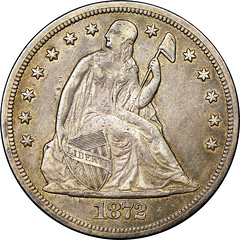
PREV ARTICLE
NEXT ARTICLE
FULL ISSUE
PREV FULL ISSUE
VOCABULARY TERMS: TEST CUT, TEST MARKDick Johnson submitted these entries from his Encyclopedia of Coin and Medal Terminology. Thanks. -Editor
Test Cut, Test Mark. A purposely made cut into the edge of a numismatic item by unthinking people to ascertain the item's base composition. Usually this occurs to a plated piece, but even solid metal items - particularly precious metals, gold and silver - are susceptible to such unfortunate practice. People who make test cuts are not professionals, but amateurs who think a test cut is considered a way to make a quick assay of the item's fineness. Unfortunately this practice is a mutilation of the item and it lowers both numismatic condition and value. Instead, to ascertain the base metal a specific gravity test or other nondestructive tests should be conducted. Only if these are inconclusive, should a very light file cut be made in the most unobtrusive part of the rim where a magnifying glass would reveal the color of the base metal (but even file cuts are discouraged by some). In America the mutilating test cut (where metal is removed) is also called a knife cut, in both Britain and the continent, a chisel cut. Cuts in silver objects, usually near the hallmarks were once called assay groove in previous centuries. An unintentional, but sometimes similar defect on the edge - as from dropping a piece - is called edge nick; the two should not be confused. The purpose of the test cut is to identify the color of the underlying metal. This may not be obvious at first inspection, for example, copper may appear pink instead of red. For other color identities see bleeding.  
Images from NGC Coin Explorer
Test marked coins. Breen relates the history of four dates of Carson City silver dollars, 1870-73, which often exhibit test marks. After claims were made that these CC dollars were lightweight and low fineness, the Philadelphia Mint ordered samples sent to them for assay. This proved to be true, resulting in the dismissal of the Carson City Mint Superintendent, H.F. Rice. Publicity of this caused widespread testing of these dollars by banks and individuals, with many returned for melting. A few remaining specimens still exhibit test marks where this testing once occurred. The gold coins struck at Carson City of the same period were also suspect but Breen did not report observing test marks on any of these. Never perform a test cut to the edge of any coin or medal. This drastically lowers the value and such an item is considered damaged. If you are seeking the identity of the base metal or under composition it is best to perform a nondestructive specific gravity test. If this is inconclusive, then have a professional perform a file cut for a microscopic examination of the base metal. Do not perform test cuts yourself! References:
Looking for the meaning of a numismatic word, or the description of a term? Try the Newman Numismatic Portal's Numismatic Dictionary at: https://nnp.wustl.edu/library/dictionary Or if you would like a printed copy of the complete Encyclopedia, it is available. There are 1,854 terms, on 678 pages, in The Encyclopedia of Coin and Medal Technology. Even running two a week would require more than 19 years to publish them all. If you would like an advance draft of this vital reference work it may be obtained from the author for your check of $50 sent postpaid. Dick Johnson, 139 Thompson Drive, Torrington, CT 06790. 
Wayne Homren, Editor The Numismatic Bibliomania Society is a non-profit organization promoting numismatic literature. See our web site at coinbooks.org. To submit items for publication in The E-Sylum, write to the Editor at this address: whomren@gmail.com To subscribe go to: https://my.binhost.com/lists/listinfo/esylum All Rights Reserved. NBS Home Page Contact the NBS webmaster 
|